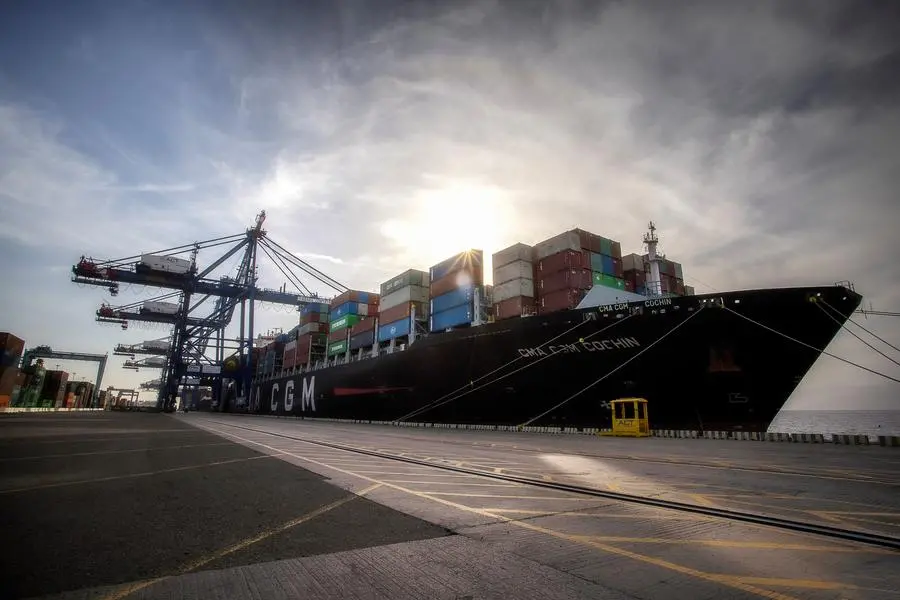PHOTO
Aqaba Container Terminal (ACT), has climbed in ranking among global container ports to achieve a position of 35 out of 370 ports listed for 2021 – a jump of six places vs. previous year. ACT is now the most efficient port in the Levant, by a considerable margin, and it comes as a direct result of the large investments made to enhance operational performance at the Aqaba terminal in recent years.
The results were published in a recent report, The Container Port Performance Index 2021 (CPPI), which was compiled by the World Bank Group together with S&P Global Market Intelligence. The CPPI rates the performance of shipping ports around the globe by comparing the amount of time container ships spent in port to complete workloads over the course of 2021.
ACT is Jordan’s only container port and essential to the Kingdom’s supply chain. More than that, it is an important regional transit hub which holds a strategic location linking more than 45 million consumers in Jordan, Iraq, Syria, the West Bank and Saudi Arabia to the world. As the ranking proves, it is outperforming competing ports in the Mediterranean on efficiency, becoming the preferred gateway to the Levant for major shipping lines, which can make considerable savings by calling at Aqaba to avoid these heavily congested routes. As a result, the port has seen in-transit volumes, that are destined for other regional markets, grow consistently. Moreover, ACT is a major partner in Jordan’s infrastructure development plans, with a particular emphasis on connections to neighboring markets, to help ensure that it remains efficient and sustainable going forward.
The port’s results also show that investments at the container terminal itself are paying off. Since 2006, when it was established as a joint venture between Aqaba Development Corporation and APM Terminals, a company of the A. P. Moller-Maersk Group, more than 320 million US dollars have been invested to upgrade its facilities and technology, which includes bringing specialized machinery and digitizing tasks to make them faster, safer, and more accurate. ACT has also demonstrated its commitment to investing in its employees’ capabilities through a program of continuous improvement aiming to streamline operations for optimized time, cost, and flow efficiency. The effect for ACT’s customers and its contribution to the Jordanian economy has been remarkable.
In 2013 ACT expanded its waterfront by 1,000-meters, which increased its capacity to more than 1.3 million cargo containers (measured in 20-foot equivalent units or TEUs), and there remains room for continued growth as more-and-more investments are being poured into the development of the Kingdom’s infrastructure, including plans for a Jordanian railway which will ensure sustainable and reliable transportation of goods to and from the port.
The statistics used by CPPI 2021 are based on measurements of total port time and compared with ports in their region as well as global ports of similar call sizes. This was made possible by data collected through the Automatic Identification System, which is used to track and monitor ships as the navigate the globe. The study comprises 370 ports and data from 11 of the world’s largest maritime shipping companies, representing close to 80 percent of the global sector.
Recent years have seen unprecedented rates of port congestion and disruptions to global supply chains, caused by the cumulative impacts of the COVID-19 pandemic, one of the largest container ships in the world running aground in the Suez Canal, and more recently the Russian invasion of Ukraine. These supply chain issues have caused the shortages and rising costs of certain products, and is also putting stress on ports, disrupting schedules, and increasing delays on ships when docked.
The reason why CPPI is based on dwell times is that when ships fall behind schedule there is a risk for congestion which has a snowballing effect on subsequent arrivals. When ships arrive at ports outside of their agreed timeslot, the effects can be felt beyond the port as disruption to supply chains and damage the national economy. In order to address this risk, ACT has successfully implemented measures that prioritize ships which arrive within their designated berthing windows, thereby maintaining the efficiency and reliability of the port’s operations. In fact, it has reduced both truck waiting times and vessel port stays, with delivery of cargo decreasing to just a week.
The aim of the CPPI report is not only to classify ports according to their efficiency, but to identify opportunities for improvement and stimulate key stakeholders to look for ways to cooperate on development. This is especially important in developing economies, since inefficiency damages economic growth and employment prospects, and increases costs for traders in markets where the margins are already slim.
The large investments APM Terminals have made at ACT over the years, in financial terms as well as know-how drawn from its global network of 75 ports, has created a port that is coping remarkably well in the face of ongoing global supply-chain issues. This was borne out by ACT’s resilience throughout the pandemic crisis. It is no exaggeration to say that ACT today plays a pivotal role in the Jordanian economy, or that the port contributes greatly to advancing the Kingdom’s international competitiveness as well as strengthening its supply chain.
-Ends-




















